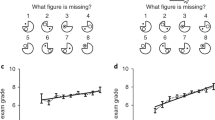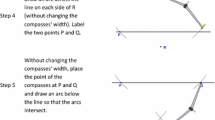Abstract
The introduction to this article gives a short overview of the main theoretical ideas which have been advanced to explain the low cognitive perfomances of retarded persons in learning and problem solving. The question of how retarded learners organize and control their problem solving activities led the authors to conduct a series of single case studies investigating qualitative and dynamic aspects of retarded learning. Metacognitive training research, socio-cognitive theories and a schema-theoretical top-down/bottom-up model of information processing constitute the theoretical background. In a tutorial setting mentally retarded and learning disabled subjects were presented tasks which consist of connecting amorphous clouds of dots in order to reproduce geometrical model figures. Verbal and behavioral data were collected to precisely describe the subjects problem solving activities. Post-hoc a two-dimensional category system listing 28 different problem solving components was developed. The first dimension introduces a distinction between explorative, elaborative, planning and control components, the second dimension specifies whether the components are initiated topdown or bottom-up. This category system is presented in detail followed by a few examples of analyzed problem solving sequences. Finally, the proposed model and inherent methodological problems are discussed.
Résumé
Une brève introduction présente les théories principales qui ont été avancées pour expliquer la perfomance cognitive insuffisante caractéristique pour la résolution de problèmes et l’apprentissage des sujets mentalement arriérés. La question de savoir comment ces sujets organisent et contrôlent leurs activités cognitives a amené les auteurs a exécuter une série d’études de cas individuels explorant des aspects qualitatifs et dynamiques de leur apprentissage. Des recherches métacognitives, des théories socio-cognitives et un modèle du traitement de l’information issu de la théorie des schèmes (top-down/bottom-up model) en constituent la base théorique. Des sujets présentant des difficultés d’apprentissage ou une arriération mentale ont résolu avec un tuteur des tâches demandant la reproduction de figures géométriques en reliant des points apparemment désorganisés. Pour la description précise de leurs activités des donnés verbales et comportamentales ont été recueillies. Post-hoc un système de classification comprenant 28 activités différentes a été développé. Sur une première dimension, ce système regroupe des activités d’exploration, d’élaboration, de planification et de contrôle. La deuxième dimension spécifie l’origine d’activation (top-down ou bottom-up). Ce système est présenté en détail et est suivi de quelques analyses de séquences de résolution de problèmes. A la fin, le modèle proposé ainsi que des problèmes méthodologiques inhérents sont discutés.
Similar content being viewed by others
References
Atkinson, R. C., & Shiffrin, R. M. (1968). Human memory: A proposed system and its control processes. In K. W. Spence & J. T. Spence (Eds.),The psychology of learning and motivation. Advances in research and theory (Vol. 2) (pp. 90–197), New York: Academic Press.
Belmont, J. M., & Butterfield, E. C. (1977). The instructional approach to developmental cognitive research. In R. Kail & J. Hagen (Eds.),Perspectives on the development of memory and cognition (pp. 437–481). Hilldale, NJ: Erlbaum.
Belmont, J. M., Butterfield, E. C., & Borkowski, J. G. (1978). Training retarded people to generalize memorization methods across memory tasks. In M. M. Gruneberg, P. E. Morris & R. N. Sykes (Eds.),Practical aspects of memory (pp. 418–425), London: Academic Press.
Bjorklund, D. F. (1985). The role of conceptual knowledge in the development of organization in children’s memory. In C. J. Brainerd & M. Pressley (Eds.),Basic processes in memory development: Progress in cognitive development research (pp. 103–142), New York: Springer.
Borkowski, J. G., & Büchel, F. P. (1983). Learning and memory in the mentally retarded. In M. Pressley & J. R. Levin (Eds.),Cognitive strategy research. Psychological foundations (pp. 103–128). New York: Springer.
Borkowski, J. C., & Cavanaugh, J. C. (1979). Maintenance and generalization of skills and strategies by the retarded. In N. A. Ellis (Ed.),Handbook of mental deficiency: Psychological theory and research (2nd ed.) (pp. 569–617). Hillsdale, NJ: Erlbaum.
Borkowski, J. G., & Kurtz, B. E. (1987). Metacognition and executive control. In J. G. Borkowski & J. D. Day (Eds.),Cognition in special children: Comparative approaches to retardation, learning disabilities and giftedness (pp. 123–152). Norwood, NJ: Ablex.
Borkowski, J. G., Peck, V. A., Reid, M. K., & Kurtz, B. E. (1983). Impulsivity and strategy transfer: Metamemory as mediator,Child development, 54, 459–473.
Borkowski, J. G., Reid, M. K., & Kurtz, B. E. (1984). Metacognition and retardation: Paradigmatic, theoretical and applied perspectives. In P. Sperber, R. Brooks & C. McCauley (Eds.),Learning and cognition in the mentally retarded (pp. 55–75). Hillsdale, NJ: Erlbaum.
Brown, A. L. (1978). Knowing when, where and how to remember: A problem of metacognition. In R. Glaser (Ed.),Advances in instructional psychology (pp. 77–165). Hilldale, NJ: Erlbaum.
Brown, A. L., Campione, J. C., & Barclay, C. R. (1979). Training self-checking routines for estimating test readiness: Generalization from list learning to prose recall,Child Development, 50, 501–512.
Brown, A. L., & DeLoache, J. S. (1978). Skills, plans and self-regulation. In R. S. Siegler (Ed.),Children’s thinking: What develops? (pp. 3–36). Hillsdale, NJ: Erlbaum.
Bruner, J. S. (1983).Le développement de l’enfant: Savoir faire et savoir dire. Paris: PUF.
Büchel, F. (1982). Metacognitive variables in the learning of written text. In A. Flammer & W. Kintsch (Eds.),Discourse Processing (pp. 352–359). Amsterdam: North Holland.
Büchel, F. (1983).Lernstrategien bei Jugendlichen und Erwachsenen in der beruflichen Ausbildung. Habilitationsschrift, Universitat Basel.
Büchel, F. (1984).Verbale Daten-eine methodologische Alternative? Protokoll der Arbeitsgruppe 1 an der 11. Schweiz. Tagung psychologischer Forscher (Manuskript), Fribourg.
Büchel, F. (1988). Training of memory strategies with adolescents in vocational schools. In F. E. Weinert & M. Perlmutter (Eds.),Memory development: Universal changes and individual differences (pp. 131–144). Hillsdale, HJ: Erlbaum.
Büchel, F., & Scharnhorst, U. (1989).Socially mediated problem solving in the mentally retarded: Theoretical outlines and single case data. Paper presented at the Gatlinburg Conference on research and theory in mental retardation and developmental disabilities, Gatlinburg.
Campione, J. C. (1984). Ein Wandel in der Instruktionsforschung mit lernschwierigen Kindern: Die Berücksichtigung metakognitiver Komponenten. In F.E. Weinert & R.H. Kluwe (Hrsg.),Metakognition, Motivation und Lernen (pp. 109–131). Stuttgart: Kohlhammer.
Chi, M. T. H. (1978). Knowledge structures and memory development. In R. Siegler (Ed.),Children’s thinking: What develops? (pp. 73–96). Hillsdale, NJ: Erlbaum.
Chi, M. T. H. (1983). Interactive roles of knowledge and strategies in the development of organized sorting and recall. In S. Chipman, J. Segal & R. Glaser (Eds.),Thinking and learning skills: Current research and open questions (Vol. 2). Hillsdale, NJ: Erlbaum.
Chi, M. T. H. (1984). Bereichsspezifisches Wissen und Metakognition. In F.E. Weinert & R.H. Kluwe (Hrsg.),Metakognition, Motivation und Lernen (pp. 211–232), Stuttgart: Kohhammer.
Chi, M. T. H., Feltovich, P., & Glaser, R. (1981). Categorization and representation of physics problems by experts and novices,Cognitive Science, 5, 121–152.
Ellis, N. R. (1970). Memory processes in retardates and normals. In N. R. Ellis (Ed.),International review of research in mental retardation (Vol.4) (pp. 1–32). New York: Academic Press.
Ericsson, K. A., & Simon, H. A. (1979).Thinking aloud protocols as data. Working Paper, No. 397, Carnegie-Mellon University.
Feuerstein, R. (1979).The dynamic assessment of retarded performers: The learning potential assessment device, theory, instruments and techniques. Baltimore: University Park Press.
Feuerstein, R. (1980).Instrumental Enrichment. An intervention program for cognitive modifiability. Baltimore: University Park Press.
Flavell, J. H., & Wellman, H. (1977). Metamemory. In R.V. Kail & J.W. Hagen (Eds.),Perspectives on the development of memory and cognition (pp. 3–33). Hillsdale, NJ: Erlbaum.
Glidden, L. M. (1979). Training of learning and memory in retarded persons: Strategies, techniques and teaching tools. In N. R. Ellis (Ed.),Handbook of mental deficiency (2nd ed) (pp. 619–657). Hillsdale, NJ: Erlbaum.
Kendall, C. R., Borkowski, J. G., & Cavanaugh, J. C. (1980). Metamemory and the transfer of an interrogative strategy by EMR children,Intelligence, 4, 255–270.
Lindberg, M. A. (1980). Is knowledge base development a necessary and sufficient condition for memory development?,Journal of Experimental Child Psychology, 30, 401–410.
McFarland, C. E. Jr., & Wiebe, D. (1987). Structure and utilization of knowledge among special children. In J. G. Borkowski & J. D. Day (Eds.),Cognition in special children. Comparative approaches to retardation, learning disabilities and giftedness (pp. 87–121). Norwood, NJ: Ablex.
Norman, D. A., & Bobrow, D. C. (1975). On data-limited and resource-limited processes,Cognitive Psychology, 7, 44–64.
Norman, D. A., & Rumelhart, D. E. (1975).Explorations in cognition. San Franscisco: Freeman.
Rumelhart, D. E., & Ortony, A. (1977). The representation of knowledge in memory. In R. C. Anderson, R. J. Spiro & W. E. Montague (Eds.),Schooling and the acquisition of knowledge (pp. 99–135). Hillsdale: Erlbaum.
Schneider, W. (1985). Developmental trends in the metamemory-memory behavior relationship: An integrative view. In D. L. Forrest-Pressley, G. E. MacKinnon & T. G. Waller (Eds.),Cognition, metacognition and human perfomance (Vol. 1) (pp. 57–109), New York: Academic Press.
Van Dijk, T. A., & Kintsch, W. (1983).Strategies of discourse comprehension. Orlando: Academic Press.
Vygotsky, L. S. (1969, orig. 1934).Denken und Sprechen. Frankfurt: Fischer.
Vygotsky, L. S. (1978).Mind in society: The development of higher psychological processes. Cambridge: Harvard University Press.
Wertsch, J. V. (1985).Vygotsky and the social formation of mind. New York: Harvard University Press.
Author information
Authors and Affiliations
Additional information
The reported research was supported by the Swiss National Science Foundation (Grant No 1.981-0.84).
Rights and permissions
About this article
Cite this article
Scharnhorst, U., Büchel, F.P. Cognitive and metacognitive components of learning: Search for the locus of retarded perfomance. Eur J Psychol Educ 5, 207–230 (1990). https://doi.org/10.1007/BF03172683
Received:
Issue Date:
DOI: https://doi.org/10.1007/BF03172683




